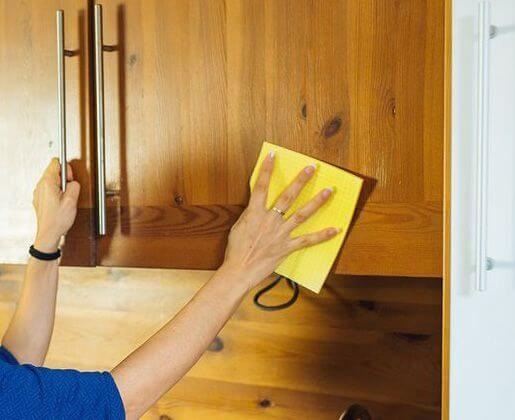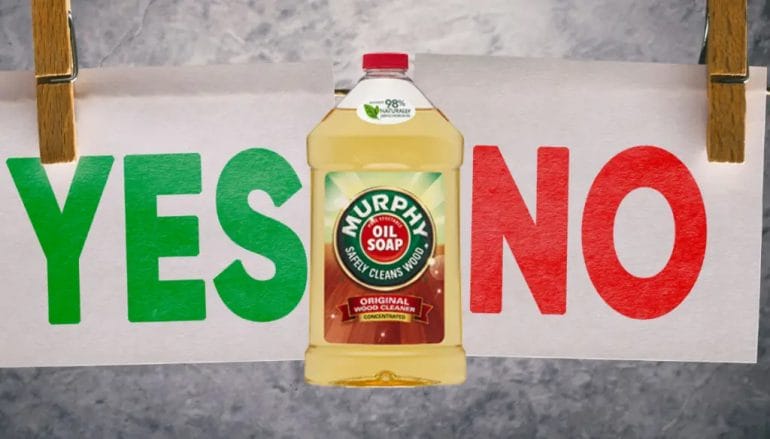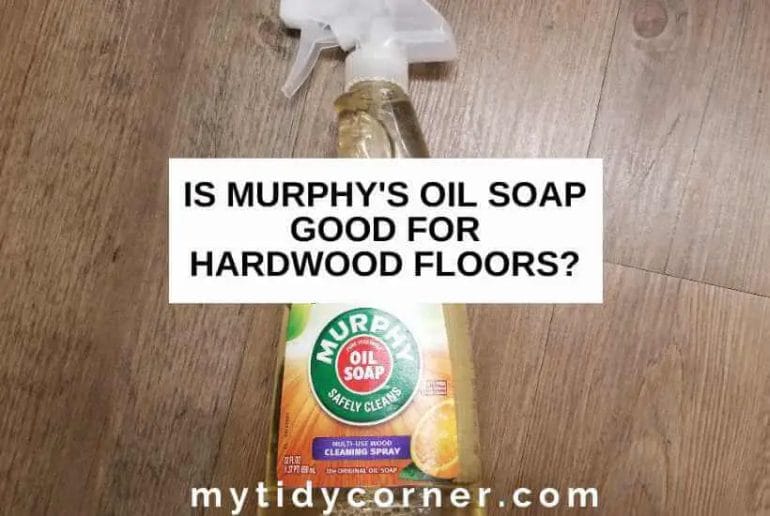Murphy Oil Soap is a trusted and effective solution for cleaning and maintaining wood floors. Its gentle formula is specifically designed to remove dirt, grime, and build-up without damaging the natural beauty of your floors. With its all-natural ingredients, it leaves behind a fresh and natural scent, while restoring the shine and luster of your wood floors. So, if you’re looking for a reliable product to keep your wood floors clean and well-maintained, Murphy Oil Soap is definitely worth a try.

How to Use Murphy Oil Soap to Clean and Maintain Wood Floors
Wood floors can add a touch of elegance and warmth to any home. However, they require regular cleaning and maintenance to keep them looking their best. One popular product that many homeowners turn to is Murphy Oil Soap. In this section, we will explore how to effectively use Murphy Oil Soap to clean and maintain wood floors.

1. Gather the Necessary Supplies
Before you begin cleaning your wood floors with Murphy Oil Soap, make sure you have all the necessary supplies. These include:
- Murphy Oil Soap
- A bucket
- A microfiber mop or a soft-bristled brush
- Warm water
2. Prepare the Cleaning Solution
The next step is to prepare the cleaning solution. Fill a bucket with warm water and add a small amount of Murphy Oil Soap. The recommended ratio is 1/4 cup of Murphy Oil Soap for every gallon of water.
3. Test in an Inconspicuous Area
Before you start cleaning the entire floor, it’s important to test the solution in an inconspicuous area to ensure it does not cause any damage or discoloration. Apply a small amount of the solution to a hidden spot and wait a few minutes to observe any adverse reactions.
4. Clean the Wood Floor
Once you’ve tested the solution and it is safe to use, you can proceed to clean the wood floor. Dip the microfiber mop or soft-bristled brush into the cleaning solution and wring out any excess water. Gently mop or scrub the floor, working in small sections at a time. Avoid using excessive water, as it can cause damage to the wood.
If you encounter any stubborn stains or dirt, you can apply a small amount of undiluted Murphy Oil Soap directly to the affected area and gently scrub with a soft cloth or brush. Rinse the area with clean water and dry it thoroughly.
5. Rinse and Dry the Floor
After cleaning the entire floor, it’s important to rinse away any residue from the Murphy Oil Soap. Fill a clean bucket with warm water and use a clean mop or cloth to rinse the floor. Ensure that all the soap is removed to prevent any build-up.
Once the floor is rinsed, use a dry mop or cloth to thoroughly dry the surface. Excess moisture can damage the wood, so it’s important to remove any dampness.
6. Maintain the Wood Floors
In addition to regular cleaning, maintaining your wood floors is essential to keep them looking their best. Here are some tips to help you maintain your wood floors:
- Sweep or vacuum regularly to remove dirt and debris
- Place doormats at entryways to prevent dirt from being tracked onto the floors
- Use furniture pads or felt protectors to prevent scratches from furniture
- Avoid excessive water and clean up spills immediately to prevent damage
- Periodically apply a wood floor polish or wax to keep the floors protected and shiny
Summary
Using Murphy Oil Soap to clean and maintain wood floors can help restore their natural beauty and prolong their lifespan. By following the steps outlined above and regularly maintaining your wood floors, you can keep them looking their best for years to come.

Common Mistakes to Avoid When Using Murphy Oil Soap on Wood Floors
Wood floors can add warmth and elegance to any home, and proper maintenance is essential to keep them looking their best. Murphy Oil Soap is a popular choice for cleaning and protecting wood floors, but it’s important to use it correctly to avoid any potential damage. In this section, we will discuss some common mistakes to avoid when using Murphy Oil Soap on wood floors.
1. Using Too Much Soap
One of the most common mistakes people make when using Murphy Oil Soap on wood floors is using too much soap. While it may be tempting to add extra soap for extra cleaning power, this can actually leave behind a sticky residue on the surface of the floor. Instead, follow the instructions on the bottle and use the recommended amount of soap mixed with water.
2. Not Diluting the Soap Properly
Murphy Oil Soap is a concentrated product that needs to be diluted with water before use. Failure to dilute the soap properly can result in a buildup of soap residue on your wood floors. To avoid this, always dilute the soap according to the instructions provided on the bottle and mix it thoroughly with water before applying it to your floors.
3. Using Excess Water
Another mistake to avoid when using Murphy Oil Soap on wood floors is using excess water. Wood is a porous material that can absorb water, and excessive moisture can lead to warping, cupping, or swelling of the wood. When cleaning your wood floors with Murphy Oil Soap, wring out the mop or cloth thoroughly to remove any excess water before applying the soap.
4. Not Rinsing the Floor
Murphy Oil Soap is designed to clean and moisturize wood floors, but it should always be rinsed off after application. Failure to rinse the floor can result in a dull, hazy appearance and may lead to a buildup of residue over time. After applying the soap, use a clean mop or cloth dampened with water to thoroughly rinse the floor and remove any remaining soap.
5. Using Abrasive Tools
It’s important to avoid using abrasive tools or harsh scrub brushes when cleaning wood floors with Murphy Oil Soap. These tools can scratch or damage the surface of the wood, leading to an uneven appearance. Instead, use a soft mop or cloth to gently clean the floors and remove any dirt or grime.
6. Not Testing on a Small Area
Before applying Murphy Oil Soap to your entire wood floor, it’s always a good idea to test it on a small, inconspicuous area first. This will allow you to check for any adverse reactions or discoloration. If the soap does not cause any issues, you can proceed to clean the rest of the floor with confidence.
7. Neglecting Regular Maintenance
While Murphy Oil Soap can help keep your wood floors clean and conditioned, it is not a substitute for regular maintenance. Sweeping or vacuuming your floors regularly and promptly wiping up any spills or stains is essential to prevent dirt and grime from building up on the surface. Regular maintenance will help extend the life and beauty of your wood floors.
By avoiding these common mistakes, you can effectively use Murphy Oil Soap to clean and protect your wood floors, maintaining their natural beauty for years to come.

Tips for Choosing the Right Murphy Oil Soap Product for Your Wood Floors
When it comes to caring for your wood floors, choosing the right cleaning product is essential. Murphy Oil Soap is a popular choice for many homeowners due to its effectiveness and gentle ingredients. However, with a variety of Murphy Oil Soap products available, it can be overwhelming to determine which one is best suited for your specific wood floors. In this section, we will provide you with some helpful tips to guide you in selecting the right Murphy Oil Soap product for your wood floors.
1. Consider the Type of Wood
Wood floors come in various types, including hardwood, engineered wood, and laminate. Each type has its own unique characteristics and requires specific care. Before purchasing a Murphy Oil Soap product, it is important to determine the type of wood your floors are made of. This will help you choose a product that is compatible and safe for your specific wood flooring.
2. Assess the Finish
Wood floors can have different finishes, such as polyurethane, wax, or varnish. The finish plays a crucial role in protecting the wood and determining the appropriate cleaning method. Some Murphy Oil Soap products are specifically formulated for certain finishes, while others are suitable for multiple finishes. Be sure to check the product label or description to ensure compatibility with your floor’s finish.
3. Take Note of Sensitivities or Allergies
Some individuals may have sensitivities or allergies to certain ingredients commonly found in cleaning products. If you or anyone in your household has known sensitivities, it is important to read the ingredient list of the Murphy Oil Soap product you are considering. Look for hypoallergenic options or products that are free from harsh chemicals or fragrances.
4. Consider the Level of Cleaning Required
Not all wood floors require the same level of cleaning. Some may only need light maintenance, while others may require a more intensive cleaning routine. Murphy Oil Soap offers a range of products that cater to different cleaning needs. If your wood floors are regularly exposed to heavy foot traffic or have accumulated stubborn dirt and grime, opt for a stronger formula or concentrate for a deeper clean.
5. Read Customer Reviews
Customer reviews can provide valuable insights into the effectiveness, ease of use, and overall satisfaction of Murphy Oil Soap products. Take the time to read reviews from other homeowners who have used the product on their wood floors. Look for reviews that specifically mention similar wood types or finishes to yours. This will give you a better idea of how well the product performs on floors similar to yours.
6. Seek Professional Advice
If you are unsure about which Murphy Oil Soap product to choose or have specific concerns regarding your wood floors, it is always beneficial to seek advice from professionals. Consult with a flooring expert or contact Murphy Oil Soap directly for personalized recommendations based on your particular needs and floor specifications.
In summary, choosing the right Murphy Oil Soap product for your wood floors involves considering the type of wood, assessing the finish, taking note of sensitivities or allergies, considering the level of cleaning required, reading customer reviews, and seeking professional advice when needed. By following these tips, you can ensure that you select a Murphy Oil Soap product that will effectively clean and protect your wood floors, keeping them looking beautiful for years to come.
Alternative Cleaning Methods for Wood Floors: Comparing Murphy Oil Soap to Other Products
Wood floors are a beautiful and timeless addition to any home. They provide a warm and elegant aesthetic that can enhance the overall look and feel of a space. However, with regular use, wood floors can accumulate dirt, grime, and stains, requiring proper cleaning and maintenance.
When it comes to cleaning wood floors, there are numerous products available on the market. One popular option is Murphy Oil Soap, a well-known brand that has been trusted for generations. But how does Murphy Oil Soap compare to other cleaning products? Let’s explore some alternative cleaning methods for wood floors and see how they stack up against Murphy Oil Soap.
1. Vinegar and Water Solution
Vinegar is a natural and cost-effective cleaning solution that can be used on wood floors. By combining equal parts of white vinegar and water, you can create a gentle yet effective cleaning solution. Simply dampen a mop or cloth with the vinegar and water mixture and gently wipe the surface of the wood floor. Vinegar helps to remove dirt and grime without leaving behind residue or streaks.
While vinegar is a great alternative to commercial cleaning products, it may not be as effective on stubborn stains or heavily soiled areas. Additionally, its strong odor may not be appealing to some individuals.
2. Bona Hardwood Floor Cleaner
Bona is a reputable brand that offers a range of cleaning products specifically designed for hardwood floors. Their hardwood floor cleaner is pH-neutral and leaves no dulling residue behind. It effectively removes dirt, grime, and spills while protecting the finish of the wood.
Compared to Murphy Oil Soap, Bona hardwood floor cleaner is a more specialized product for wood floors. It is known for its streak-free formula and compatibility with various wood finishes. However, Bona products may be slightly more expensive than other alternatives.
3. Homemade Castile Soap Solution
Castile soap, made from vegetable oils, is a natural and gentle cleaner that can be used on wood floors. To create a homemade cleaning solution, mix a small amount of liquid Castile soap with warm water. Apply the solution to the wood floor using a damp mop or cloth, then rinse with clean water.
While Castile soap is a mild and eco-friendly option, it may not be as effective at removing tough stains or heavy dirt buildup. It is best suited for regular maintenance cleaning rather than deep cleaning.
4. Steam Cleaning
Steam cleaning is a popular method for deep cleaning wood floors. It uses hot steam to penetrate the surface and loosen dirt and grime. However, it is important to use caution when steam cleaning wood floors as excessive moisture can cause damage to the wood. Follow the manufacturer’s instructions and use a steam cleaner specifically designed for wood floors.
Compared to Murphy Oil Soap and other traditional cleaning methods, steam cleaning offers a more thorough and hygienic clean. It eliminates the need for harsh chemicals and is effective at removing tough stains and bacteria. However, it may not be suitable for all types of wood floors, so it is important to check with the flooring manufacturer before using this method.
Summary
When it comes to cleaning wood floors, there are several alternative methods to choose from. While Murphy Oil Soap has been a trusted product for many years, it is important to consider other options that may better suit your specific needs. Vinegar and water solutions offer a natural and cost-effective cleaning method, while products like Bona hardwood floor cleaner provide specialized care for wood floors. Homemade Castile soap solution and steam cleaning offer additional alternatives for regular and deep cleaning, respectively.
Ultimately, the best cleaning method for your wood floors will depend on factors such as the type of wood, finish, and level of dirt and stains. It is recommended to test any cleaning product or method in a small, inconspicuous area before applying it to the entire floor. Regular maintenance and proper cleaning techniques will help keep your wood floors looking their best for years to come.
FAQs
Is Murphy Oil Soap good for wood floors?
Yes, Murphy Oil Soap is a popular choice for cleaning wood floors. It is specially formulated to gently clean and protect wood surfaces. However, it’s important to follow the manufacturer’s instructions and test it on a small, inconspicuous area first to ensure compatibility with your specific wood floor finish.
Can I use Murphy Oil Soap on laminate floors?
No, Murphy Oil Soap is not recommended for use on laminate floors. Laminate floors have a protective top layer that can be damaged by oil-based products like Murphy Oil Soap. It’s best to use a cleaner specifically designed for laminate floors to maintain their appearance and longevity.
How often should I use Murphy Oil Soap on my wood floors?
The frequency of using Murphy Oil Soap on wood floors depends on various factors such as the amount of foot traffic and the level of dirt. As a general guideline, it is recommended to use it every 2-4 months or as needed. Overusing it can leave a residue on the surface, so it’s important to follow the instructions and not exceed the recommended usage.
Conclusion
In conclusion, Murphy Oil Soap is an excellent choice for cleaning and maintaining wood floors. Its gentle formula effectively removes dirt, grime, and stains without damaging the wood’s natural beauty. The soap’s natural oils provide nourishment and help restore the wood’s luster, leaving your floors looking refreshed and rejuvenated. Not only does Murphy Oil Soap clean well, but it also has a pleasant scent that leaves your home smelling fresh and clean. Its versatility makes it suitable for use on a variety of wood surfaces, including furniture and cabinets. With consistent use, you can enjoy beautifully cleaned and well-maintained wood floors for years to come.
